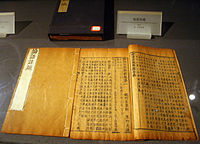He Yan
He Yan (Chinese: 何晏; pinyin: Hé Yàn) (c. 195–249) was a politician and prominent philosopher of Wei (220–265), one of the Three Kingdoms. His style name was Ping Shu (Chinese: 平叔; pinyin: Píng Shū). He was the grandson of the Han general He Jin and, after his mother was taken as a concubine by Cao Cao, was raised with the Wei royal family. He gained a reputation for intelligence and scholarship at an early age, but he was unpopular and criticized for being arrogant and dissolute. He was rejected for government positions by both Emperors Cao Pi and Cao Rui, but became a powerful minister during the rule of Cao Shuang. When the Sima Family took control of the government in a coup d'etat in 249, he was executed along with all the other officials loyal to Cao.He was, along with Wang Bi, one of the founders of the Daoist school of Xuanxue. He synthesized the philosophical schools of Daoism and Confucianism, believing that the two schools complimented each other. He wrote a famous commentary on the Daode Jing that was influential in his time, but no copies have survived. His commentary on the Analects was considered standard and authoritative for nearly 1000 years, until his interpretation was displaced by the commentary of Zhu Xi in the fourteenth century.
Personal facts

| Birth place | |
|---|---|
| Nationality | |
| Religion | |
| Date of death | January 01, 0249 |